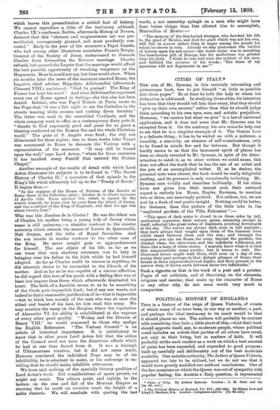CITIES OF ITALY.* THE aim of Mr. Symons, in this
certainly interesting and picturesque book, was to put himself "as little as possible into these pages." So at least he tells the lady to whom his dedication is addressed. In studying these cities, his intention has been that they should tell him their story, that they should "give up their own secrets," rather than that be should judge them according to his own eyes, ears, and artistic prejudices. However, "we receive but what we give" is a law of universal application, and it does not seem that Mr. Symons can be excepted from it. On the contrary, his own remarks help one to see that be is a singular example of it. The Genius Loci is a delicate thing ; it has to be waited on with a patience, a humility, a sincerity, an absence of self-consciousness, only to be found in minds few and far between. But though it hardly seems to us that the immanent spirit of places has been so clearly revealed to Mr. Symons, in spite of his deter- mination to catch it, as to other writers we could name, this does not affect the truth that be has the eye of an artist and the pen of an accomplished writer. If, as he desires, the personal note were absent, the book would be really delightful reading, and its presence is only occasionally irritating. Mr. Symons sees vividly and describes brilliantly. If his cities have not given him their inmost soul, their outward aspect is entirely his. Rome, Naples, Ravenna, to mention two or three, are unerringly painted. Not seldom, too, we are met by a flash of real poetic insight. Nothing could be better, for instance, than this picture of the little lake in the "neglected gardens of the Villa Falconieri " :—
" This space of dark water is closed in on three sides by tall, motionless cypresses, their solemn green, menacing enough in itself, reflected like great cubes of blackness, pointing downwards at the sky. The waters are always dark, even in full sunlight ; they have always that weight upon them of the funereal trees which stand between them and the Bun; and through the cypresses you can see Rome, far away, beyond the gardens, the stacked vines, the olive-trees, and the indefinite wilderness, set there like a heap of white stones. I scarcely know what it is that this unaccountable scene awaits ; but it seems to wait. Dis- illusioned lovers might walk there, chill even on a day of sun, seeing their past perhaps in that distant glimpse of Rome, their future iu those cypress-shadowed depths, and their present in the narrow strip of brown earth between those two infinitudes."
Such a vignette as that is the work of a poet and a painter. Pages of art criticism, and of theorising on the elements, religious and secular, that make up the character of Rome
or any other city, do not seem worth very much in comparison.




































 Previous page
Previous page